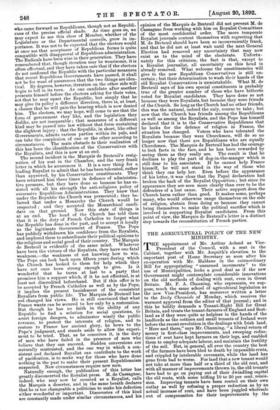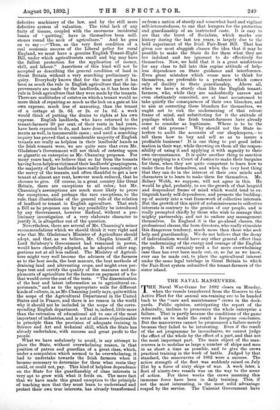THE AGRICULTURAL POLICY OF THE NEW MINISTRY.
MHE appointment of Mr. Arthur Acland as Vice- _1- President of the Council, with a seat in the Cabinet, together with Mr. Asquith's elevation to the important post of Home Secretary so soon after his co-operation with Mr. Haldane in the extraordinary Bill for appropriating "unearned increments" to the use of Municipalities, looks a good deal as if the new Government might contemplate considerable innovations on the old methods of dealing with rent, even in Great Britain. Mr. F. A. Manning, who represents, we sup- pose, much the same school of agricultural legislation as the new Vice-President, has moreover written a letter to the Daily Chronicle of Monday, which receives the warmest approval from the editor of that journal ; and in this he boldly demands a Tenant-Right Bill for Great Britain, and treats the tenant-farmers of England and Scot- land as if they were quite as helpless in the hands of the landlords as the cottiers and small tenants of Ireland were before the recent revolution in the dealings with Irish land. "Here and there," says Mr. Channing, "a liberal return of money in first-class improvements, and sweeping reduc- tions of rent have kept farmers on their legs, and enabled them to employ adequate labour, and maintain the fertility of the soil. But, in general, all over the country the best of the farmers have been bled to death by impossible rents, and crippled by intolerable covenants, while the land has gone from bad to worse. For land that a new tenant would not take at more than half or a third of the old rent, and with all manner of improvements thrown in, the old tenants have had to go on paying out of their dwindling capital the old rents, with some trifling 10 to 20 per cent. remis- sion. Improving tenants have been rented on their own outlay as well by refusing a proper reduction as by an actual increase of rent, and have been juggled wholesale out of compensation for their improvements by the defective machinery of the law, and by the still more defective system of valuation. The total lack of any fixity of tenure, coupled with the enormous incidental losses of quitting,' have in themselves been mill- stones round the neck of agriculture." And he goes on to say :—" Thus, as the very first condition of a real economic success of the Liberal policy for rural England, we must have a genuine English Tenant-Right Bill, under which agriculturists small and big may have the fullest protection for the application of money, skill, and labour." Assertions of this kind will not be accepted as describing the general condition of land in Great Britain without a very searching preliminary in- quiry. Everybody knows that for the most part it has been as much the rule in English agriculture that the im- provements are made by the landlords, as it has been the rule in Irish agriculture that they were made by the tenants. There are multitudes of estates on which a tenant would no more think of repairing so much as the lock on a gate at his own expense, much less of manuring, than the tenant of a cottage at 2s. 6d. or 2s. or is. 6d. a week would think of putting the drains to rights at his own expense. English landlords, who have returned to the tenant-farmers 30 per cent. of their rents in bad years, have been expected to do, and have done, all the improve- ments as well, in innumerable cases ; and until a searching inquiry has proved that a considerable majority of English tenants are really as helpless in their landlords' hands as the Irish tenants were, we are quite sure that even Mr. Gladstone's Government will not think of entering upon so gigantic an enterprise as Mr. Channing proposes. For many years back, we believe that so far from the tenants having been helpless victims of their landlords' graspingness, the majority of the landlords have really been completely at the mercy of the tenants, and often thankful to get a new tenant at almost any rent, however much reduced, that he chooses to give. Of course, in a great country like Great Britain, there are exceptions to all rules ; but Mr. Channing's assumptions are much more likely to prove the exceptions, and perhaps the rare exceptions, to the rule, than illustrations of the general rule of the relation of landlord to tenant in English agriculture. That such a Bill as he proposes can by any possibility be introduced by any Government, however Radical, without a pre- liminary investigation of a very elaborate character to justify it, is altogether out of the question. Nevertheless, there are several of Mr. Channing's minor recommendations which we should think it very right and wise that Mr. Gladstone's Minister of Agriculture should adopt, and that, as we believe, Mr. Chaplin himself, if Lord Salisbury's Government had remained in power, would have cheerfully adopted, as he adopted other sug- gestions not at all less radical. The Ministry of Agricul- ture might very well become the advisers of the farmers as to the best seeds, the best manure, the best methods of draining land and alternating crops, and might even per- haps test and certify the quality of the manures and im- plements of agriculture for the farmer on payment of a fee that would cover the cost of the tests. "The dissemination of the best and latest information as to agricultural ex- periments," and as to the appropriate soils for different kinds of culture, is, as Mr. Channing justly says, quitewithin the scope of the Agricultural Department in the United States and in France, and there is no reason in the world why it should not be included in the scope of the corre- sponding English department. That is, indeed, little more than the extension of educational aid to one of the most important of industries, and is not at all more objectionable in principle than the provision of adequate training in Science and Art and technical skill, which the State has already undertaken, with success and great profit to the -people.
What we have sedulously to avoid, is any attempt to place the State, without overwhelming reason, in that position of patron and guardian of a great class, which, under a compulsion which seemed to be overwhelming, it had to undertake towards the Irish farmers when it became necessary to determine for them what rents they could, or could not, pay. This kind of helpless dependence on the State for the guardianship of class interests is -very apt to grow with what it feeds on. The mere fact that we have made this grand exception to the principle of teaching men that they must learn to understand and protect their own true interests, has already transformed. us from a nation of sturdy and somewhat hard and vigilant self-interestedness, to one that hungers for the protection and guardianship of an instructed caste. It is easy to see that the burst of Socialism, which marks our history during the last ten years, is largely due to the hold. experiment of the Irish Fair-Rent Bill. That has given our most sluggish classes the idea that it may be possible to make the State do for them what they are too indolent and too ignorant to do effectively for themselves. Now, we hold that it is a great misfortune for any class to fall into this supine attitude of help- less dependence on State guidance and interference. Even great mistakes which rouse men to think for themselves, are preferable to a prudence which comes only of docility to State guardianship. Above all, when we have a sturdy class like the English tenant- farmers, who, while they are undoubtedly narrow and even obstinately conceited, are at least accustomed to take quietly the consequences of their own blunders, and to aim at correcting these blunders for themselves, we ought not to risk the undermining of that robust frame of mind, and substituting for it the attitude of pupilage which the Irish tenant-farmers have already come to consider as legitimate. Where is to be the end of this process ? Why should not the State in- terfere to audit the accounts of our shopkeepers,—to tell them how to buy and sell so as to insure a profitable business ? It is one thing to put good infor- mation in their way, while throwing on them all the respon- sibility of using it and applying it with sagacity to their own circumstances. It is quite another thing to sanction their applying to a Court of Justice to make their bargains for them, when they are quite competent to learn how to make them for themselves, and when the very best thing that they can do in the interest of their own minds and characters is to learn to make them for themselves. Mr. Sidney Webb, we suppose, will not agree in this. He would be glad, probably, to see the growth of that languid and despondent frame of mind which would tend to ex- tinguish hardy self-dependence, and promote the building- up of society into a vast framework of collective interests. But the growth of this spirit of submissiveness to collective interests is contrary to the genius of our people, and is really prompted chiefly by those who wish to manage that mighty partnership, and not to endure any management themselves. In England it is the go-ahead classes, the professional classes, the born directors, who really stimulate this dangerous tendency, much more than those who seek help and guardianship. We do not believe that the decay of individualism would have any other general effect than the undermining of the energy and courage of the English people. It will certainly need a far more overwhelming case than has ever been made out, or, so far as we know, ever can be made out, to place the agricultural interest under the same legal tutelage in Great Britain to which the Fair-Rent system submitted the tenant-farmers of the sister island.



































 Previous page
Previous page